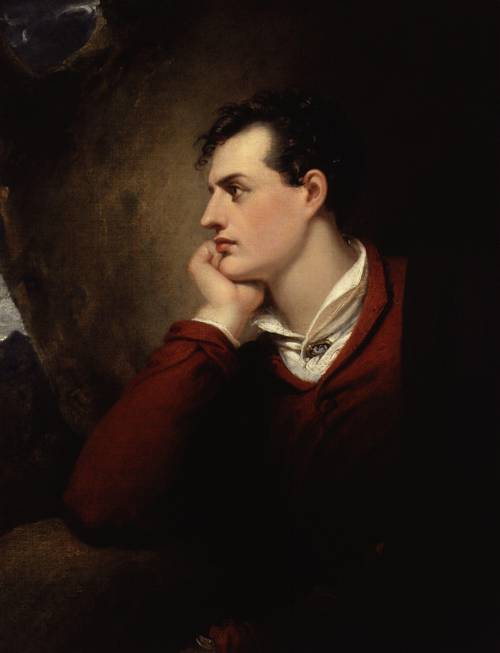
FAQ About Lord Byron

Who was Lord Byron?
Lord Byron, born George Gordon Byron in 1788, was a prominent British poet and a leading figure in the Romantic movement. His best-known works, including "Childe Harold's Pilgrimage" and "Don Juan," are celebrated for their exploration of personal freedom, nature, and emotional complexity. Byron's charismatic and often controversial lifestyle, marked by numerous love affairs and political activism, also made him a significant public figure of his time.

What are some of Lord Byron's most famous works?
Some of Lord Byron's most famous works include the narrative poem "Childe Harold's Pilgrimage," which brought him early fame, and his epic satire "Don Juan," which remains one of his most celebrated works. Other notable poems include "She Walks in Beauty," and "The Prisoner of Chillon." His works often feature themes of adventure, love, and rebellion.

Why is Lord Byron considered a key figure in the Romantic movement?
Lord Byron is considered a key figure in the Romantic movement due to his innovative and emotive style of writing, which emphasized strong emotions, individualism, and the beauty of nature, all hallmarks of the Romantic spirit. His poetry often reflected personal experiences and rebellious attitudes towards societal norms, challenging readers to reconsider traditional conventions.

What was Lord Byron's role in politics?
Lord Byron was actively involved in politics. He served in the House of Lords and was an outspoken advocate for social reform and civil rights. He supported the movements for Greek independence and Italian nationalism, even participating physically in the Greek War of Independence where he eventually succumbed to illness in 1824.

How did Lord Byron's personal life influence his writing?
Lord Byron's personal life had a significant influence on his writing. His numerous love affairs, travels, and relationships often featured in his poetry and prose, providing a rich source of inspiration for his romantic and often scandalous narratives. His experiences shaped the complexity of his characters and themes, particularly in reflections on love, freedom, and identity.

Did Lord Byron have any notable relationships?
Yes, Lord Byron's relationships were widely publicized and often controversial. He had well-known affairs with several women, including Lady Caroline Lamb, who famously dubbed him "mad, bad, and dangerous to know." His marriage to Annabella Milbanke was troubled and ended in separation. Byron also had close bonds with fellow poets like Percy Bysshe Shelley.

What is the significance of 'Don Juan' in Byron's body of work?
"Don Juan," an epic satirical poem, is considered one of Lord Byron's greatest works. It showcases his wit and command of irony, as he ingeniously reimagines the legendary womanizer as a victim of circumstance rather than a proactive seducer. The poem explores themes of human folly and societal hypocrisy, offering profound commentary on early 19th-century England.

How did Lord Byron die?
Lord Byron died on April 19, 1824, in Missolonghi, Greece, at the age of 36. He succumbed to a fever, likely exacerbated by an infection after bloodletting—a common but ultimately harmful medical practice at the time. Byron was in Greece supporting the Greek War of Independence, reflecting his passion for political and social causes.

What were some controversies surrounding Lord Byron?
Lord Byron's life was marked by numerous controversies, including his tumultuous love life, with rumors of incestual relationships and bisexuality fueling public scandal. His separation from his wife Annabella Milbanke drew widespread attention, and his critique of societal norms often put him at odds with the establishment. Byron's defiance of conventional morality made him both celebrated and notorious.

Where did Lord Byron travel during his lifetime?
Lord Byron was an avid traveler, journeying across Europe and the Mediterranean. His travels included extensive time in Italy, where he wrote much of "Don Juan," and in Greece, which he visited twice, ultimately supporting its war for independence. These travels inspired many of his works and reflected his love for freedom and adventure.

What impact did Lord Byron have on later literature?
Lord Byron's impact on literature was profound, paving the way for later Romantic and Victorian writers. His exploration of the 'Byronic hero'—a charismatic, brooding, and defiant protagonist—became a staple in literature. Byron's focus on personal freedom and deep emotion influenced many poets and novelists, including the Brontë sisters and Oscar Wilde.

Was Lord Byron involved in any notable social causes?
Yes, Lord Byron was actively involved in social causes, particularly advocating for political freedom and social reform. He supported the Greek War of Independence both financially and personally, organizing efforts and raising funds. Byron was also known to challenge oppressive institutions and express his support for Irish and Italian independence movements.

What is the 'Byronic hero' and how did Byron popularize it?
The 'Byronic hero' is a character archetype popularized by Lord Byron, characterized by a brooding, rebellious, and complex nature, often exhibiting high intelligence and a disregard for social norms. This archetype appears in works like "Childe Harold's Pilgrimage" and "Manfred," reflecting Byron's own tumultuous personality and philosophies, making it a lasting symbol in literature.

How did Lord Byron's upbringing influence his life and work?
Lord Byron's upbringing was marked by instability and financial struggles. His father's abandonment and his mother's volatile nature affected him deeply, shaping his rebellious spirit and quest for identity. These personal hardships often informed the themes of his work, contributing to the introspective and often melancholic tone found in much of his poetry.

Did Lord Byron have any notable friendships with other literary figures?
Yes, Lord Byron had notable friendships with several literary figures of the Romantic era, including Percy Bysshe Shelley and Mary Shelley. They spent time together in Switzerland, where "Frankenstein" was conceived. These relationships influenced his writing and provided intellectual companionship, fostering discussions on poetry, philosophy, and society.

What lasting legacy did Lord Byron leave behind?
Lord Byron left a significant legacy in both literature and culture. His exploration of the Romantic ethos and creation of the Byronic hero have continued to influence writers and creators across various media. Byron's commitment to political and personal freedom endures as a testament to his belief in individualism and his complex, multi-faceted approach to art and life.

How was Lord Byron's relationship with his family?
Lord Byron had a complex relationship with his family. He inherited his title and significant debts from his father, Captain John Byron. His mother, Catherine Gordon, had a tumultuous relationship with him, marked by both love and resentment, which is believed to have deeply affected Byron's emotional development and views on familial bonds.

Did Lord Byron influence other artistic fields beyond literature?
Yes, Lord Byron's influence extended beyond literature into various artistic fields, including music, visual arts, and theater. His dramatic life and works have inspired numerous paintings, musical compositions, and theatrical adaptations, reflecting the enduring fascination with his charismatic yet controversial persona.

What did Lord Byron do in support of Greek independence?
Lord Byron played a crucial role in supporting Greek independence by providing both financial aid and personal involvement. He used his fame to raise awareness and funds and even traveled to Greece to join the revolutionaries. While there, he organized resources, trained troops, and became a symbol of the international support for Greece's liberation efforts.

How has Lord Byron's work been received over time?
Lord Byron's work has seen varying receptions over time, initially gaining widespread acclaim for its boldness and emotional depth. During his life, his moral character was often criticized, overshadowing his literary contributions. However, Byron's work has experienced a resurgence in recognition, particularly for its innovative approach and impact on the Romantic movement.
